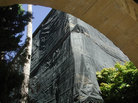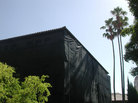day by day: a blog
August 29, 2007
jayf
 There are plenty of decent people who pay no heed to coincidences, but I am not one of them. Perhaps it "comes with the territory". It is hard for me to believe that anyone who is serious about poetry, which relies so much on linguistic coincidences, could be indifferent to the world's plethora of visual and dramatic rhymes.
There are plenty of decent people who pay no heed to coincidences, but I am not one of them. Perhaps it "comes with the territory". It is hard for me to believe that anyone who is serious about poetry, which relies so much on linguistic coincidences, could be indifferent to the world's plethora of visual and dramatic rhymes.
One afternoon while we were in Truckee earlier this month, I watched a beautiful, bright-eyed Steller's Jay standing on the ground at the edge of the hotel carpark. Head tilting from side to side, it seemed to ponder whether to shriek at me, pick back up the seed it had been holding in its beak before I wandered over, hop towards me in case I might have any better snacks to feed it, or just fly off. It was all the same to me, because I enjoy simply meeting these sparky, cocky, dark blue creatures.
Steller's Jays give the impression that they are both cunning and indiscriminate about what they will consume: "If you have it, I will eat it!" And their their bodies reinforce this idea. Their distinctive crest even makes them look like they are wearing a kind of very soft bottle-opener on top of their heads. The crest functions as a subliminal suggestion to people not to forget to leave uncovered or open all food and drink before leaving the picnic unattended in the backyard.
Outside the cities, Steller's Jays are plentiful in California, and easy to spot, because they are the only crested species of this bird-genus which lives to the west of the Rockies. Voracious, bold, mercurial, they can make many types of call. One is the faked cry of a Red-tailed Hawk, which they like to emit loudly as they approach a feeding area. The lesser, dimmer competitors for scraps take wing immediately. I've wondered whether, amongst their catalogue of noises, an imitation of a low and wicked human chuckle is one which ornithologists, on hands and knees with their furry microphones extended, have not yet been able to record.
In the end, squawking dismissively, my carpark friend flew off. But, true to character, first it made sure to do all the other things it had been contemplating: shriek at me, pick up its seed, and, with its beak still full, hop over with an expectant glint in its eye.
I went back inside to find the rest of the family. While we all pottered aimlessly around in the room, out of habit I started my laptop and, after voyaging through hotel portal upon virtual portal, like the endlessly recessing doors which open up one after another in front of you in a dream, I collected my emails. The first was from the chair of our Department, Ramón Saldívar, regretfully informing us that our colleague Jay Fliegelman had died.
I stared out at the blank, three o'clock, Western sky and felt my heart sinking. I logged off, recalling as I did that when I had typed in my own Stanford username a minute or so earlier, "jayf", Jay's own weirdly memorable computer ID, had already become already obsolete.
Now that he was gone, his uncommon use of his first name and the initial letter of his last name ("jayf") for his "official" email address seemed a more open-handed posture to the world than just using the last name ("fliegelman") would have been, or than the the predictable gesture of taking the initial letter of your first name and the whole of your last name ("njenkins") is. Why does the mind dwell on trivia like this in the face of disaster? It was the tremor of a start at assessing the new reality....
A late but in no way epigonic figure in the line of Jewish scholars who did so much in the last half-century to define influential conceptions about a specifically "American" literature, Jay had been sick in one way or another for most of his life. In fact, he might have felt that from start to finish he achieved the whole of his truly remarkable career as a scholar, collector and teacher on borrowed time. His recent work on Early American "Objects", and in particular on the period's books, seemed hauntingly underwritten by a sensitivity to the fragility and contingency of existence for both things and for people.
Recently, Jay's medical problems had become terribly acute, as the tortoise of the body finally began to catch up with the zestful, seemingly irrepressible, hare of his wonderful, leaping mind. When the department dispersed for the summer, I think we had all silently known that Jay was not likely to return for the fall. Still, the news of his passing was a shock, as the news, however expected, of the death of any person whom you have known, always more or less subtly is.
Extraordinarily intelligent, erudite, witty and inventive, Jay had what obituarists might call a "complex character". Both generous and needy (sometimes both at once), he was a heart-warming person who could also, on occasion be a touch upsetting,a touch mercurial. I suppose that, as with everyone else, he and I had a few run-ins over the years, as well as many laughs and some illuminating exchanges in which my role was as often as not that of the pleased-to-be-dazzled listener. I will remember in particular one conversation about the Star-Spangled Banner which he and I, two anti-chefs, had as we loitered next to the departmental microwave. Afterwards, it felt as though someone had switched on a powerfully directional floodlight inside my mind, one which allowed me to see the song/poem in an utterly transformed way.
I have thought about Jay often, and with gratitude, since he died. In truth, in life, he and I were more colleagues than friends. He was "senior" and I am "junior", he was as committed to upholding the idea of American Studies as I am quixotically determined to take the adjective out of that phrase, though I recall him "reminding" me once, as he accelerated through what looked suspiciously like a red light on Palm Drive, and shifted up from a point about Derrida's theory of the gift to an excursus on the visual culture of the Americas, that the first printed book to be produced on either the Northern or Southern continent was published in Mexico City. In life, sporadic stuff — departmental fire-fights as well as the occasional flash of guile or competitiveness, probably on both sides — got in the way of trust. The crackle of accidental static got too loud for either of us to listen carefully enough to the other's quieter, essential melody.
The primary fact about any death is of course the painful, once-and-for-all extinguishing of a unique human presence. It is a blow which strikes hardest at the very centre, and which in this instance falls on his widow, the scholar Christine Guth. That impact ripples outwards with decreasing though still palpable force through concentric circles of family, close associates, protégés, mentors, colleagues, acquaintances, students, and, in Jay's case, readers.
Even the remoter survivors must cope with a sadness which derives from a badly-designed feature in our brain's hard-wiring. That is the sadness which comes from only being allowed to know what we really feel about someone after they have gone. When the memory-volume is finished, you turn melancholically back through its pages and whatever your eye lights on is invariably the truth of your feelings, isolated and clarified for the first time. As I remember Jay now, what comes back for me anyway, and what I "re-read" again and again in the Jay-Book seen by my mind's eye, are those many passages of bewildering erudition, poetic insight, antic humour, learned speculation.
The day after we came home, I went in to campus to collect my mail. What greeted me as I walked towards the back of Margaret Jacks Hall was a building entirely swathed in black fabric. The mundane explanation for this is that the trim on our office windows is being repainted (black as well). Stanford's fastidious, and expensive, attention to detail in the maintenance of its infrastructure being what it is, the contractors have wrapped a vast, exquisite-looking drop-cloth vertically around the sandstone façade. Inside, the mood feels slow, sombre — as if someone had dropped a dark sheet over our birdcage to quieten us down. But whatever the practical reasons for, and the internal effects of, this measure are, externally the building has never looked more striking.
In the wake of Jay's death, we have what resembles nothing so much as a structure shrouded, Christo-like, in the cloth of mourning. And what more fitting memorial to Jay Fliegelman could there be than a huge American object which speaks mutely but clearly to us of its losses? A coincidence? Sure. But Jay would have been the last to deny us the chance to think about it for a while as a type of funereal fiction in netting and stone, the sort which tempts us to believe, as someone forgotten once said, that a coincidence is "a small miracle in which God chooses to remain anonymous."
Posted by njenkins at August 29, 2007 08:00 PM
With the exception of interspersed quotations, all writing is © 2007-09 by Nicholas Jenkins